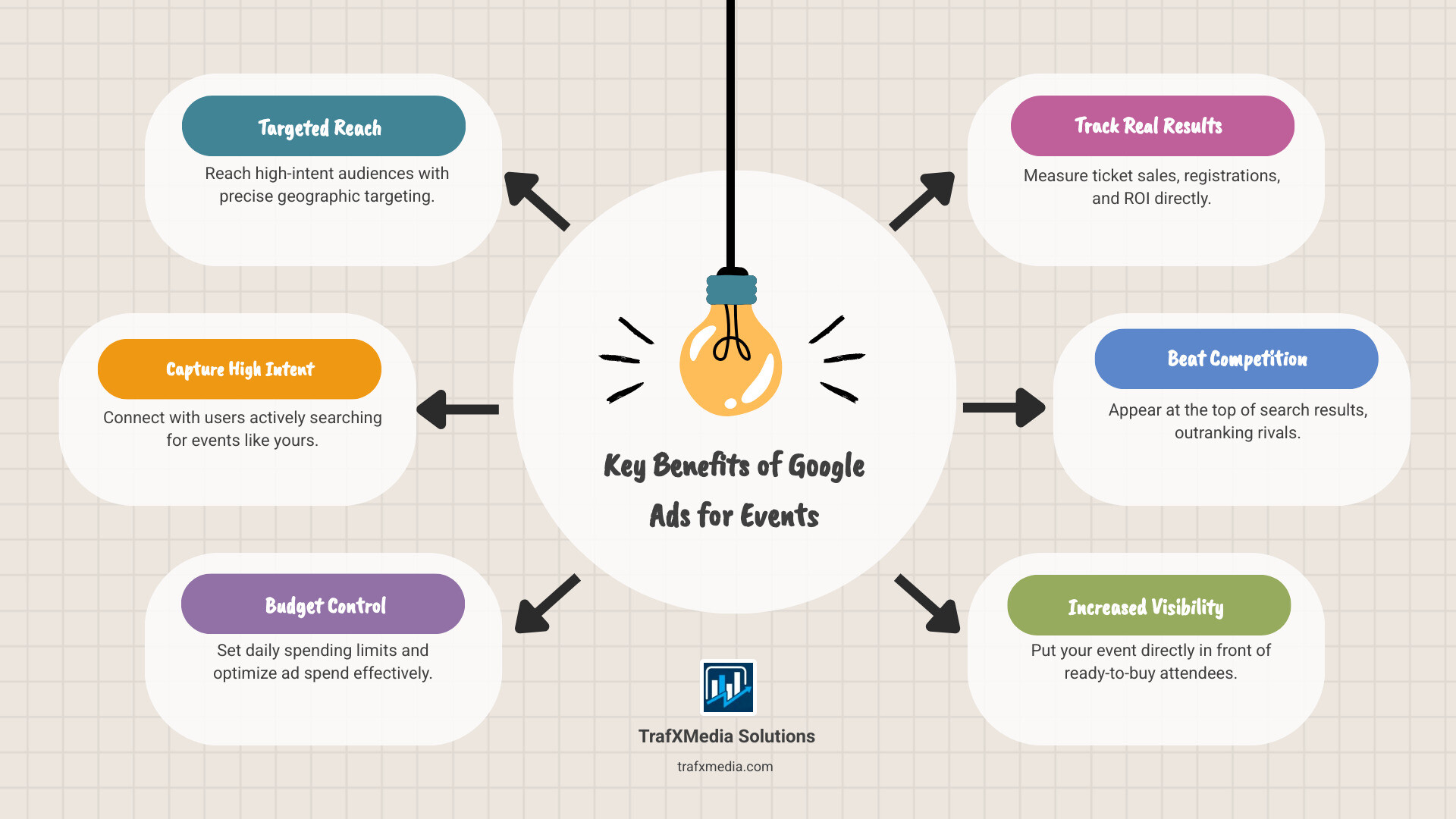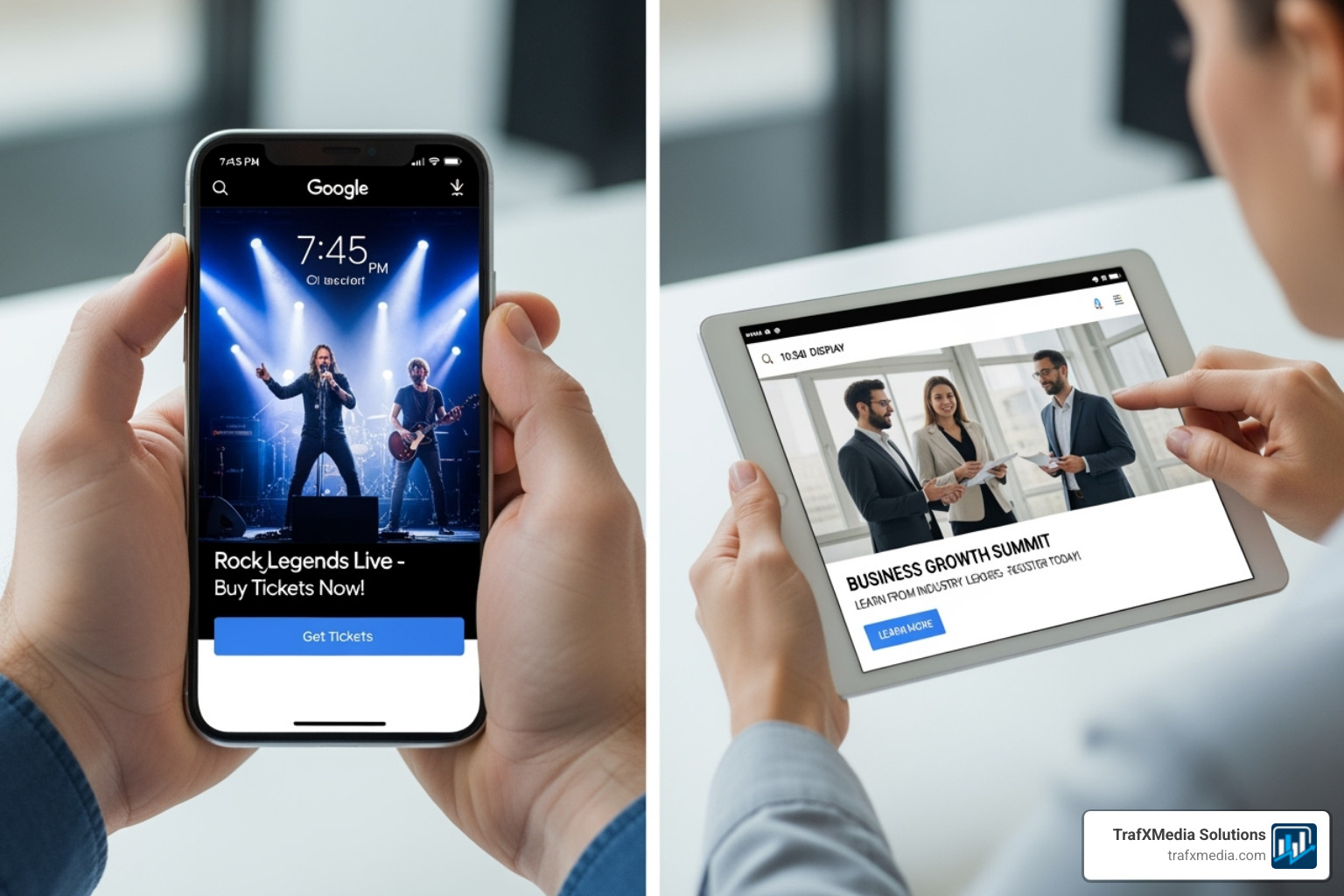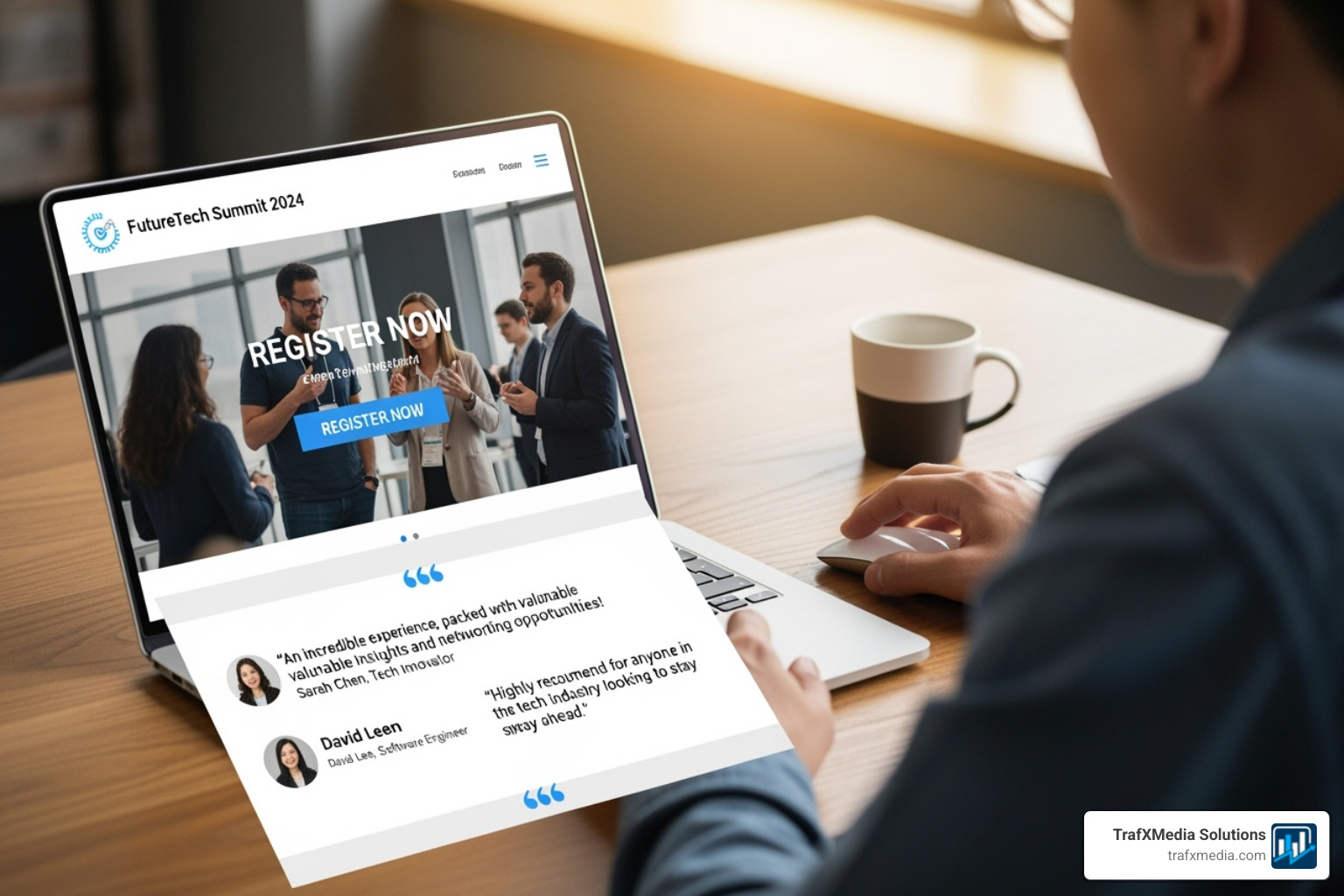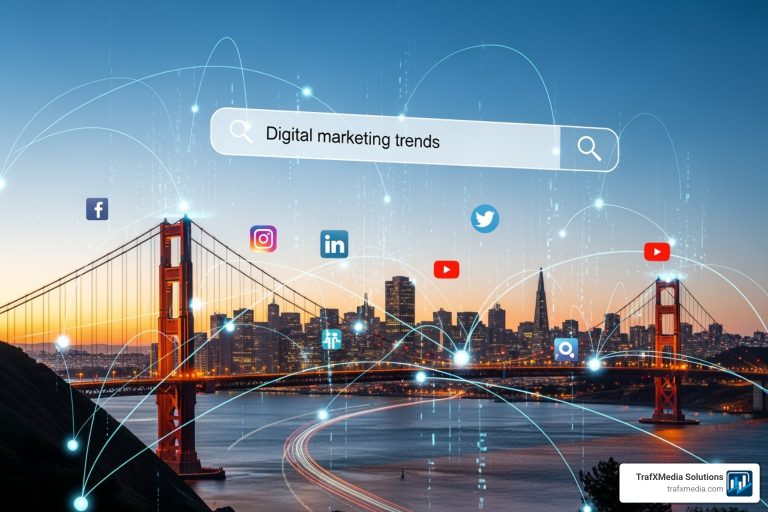Make Your Event a Hit: Google Ads Strategies That Work
Introduction: Why Google Ads is Your Event’s Secret Weapon
Google ads for events help you reach people actively searching for activities, experiences, and gatherings in your area. Unlike social media, which hopes to interrupt and catch attention, Google Ads puts your event in front of people already looking for what you offer. When someone searches for a “tech conference San Francisco,” your ad appears right when they’re ready to buy, making it a welcome solution rather than an unwelcome distraction.
Key Benefits:
- Target high-intent searchers – Reach people typing “events near me” or “[your event type] San Francisco,” capturing demand at its peak.
- Control your budget – Set strict daily spending limits and use bidding strategies like Target CPA (Cost Per Acquisition) to ensure you only pay what you want for a ticket sale.
- Track real results – Measure ticket sales, registrations, and actual attendance to calculate a clear return on investment (ROI).
- Beat the competition – Appear at the top of search results, gaining visibility even when larger competitors with bigger organic followings rely only on social posts.
- Geographic precision – Focus your budget on people within a specific driving distance of your venue, or target users in other cities who are planning to travel.
Well-run campaigns routinely turn local gatherings into packed venues, and smart targeting can dramatically lower acquisition costs by focusing spend on the most likely attendees.
The challenge? Many event organizers struggle with two key areas. First, they waste budget on overly broad keywords like “conference,” which attracts irrelevant clicks from job seekers or people looking for events in other countries. This drains the budget without generating qualified leads. Second, they fail to implement proper conversion tracking, especially when using third-party ticketing platforms like Ticketmaster or Eventbrite. Without tracking, you’re flying blind, unable to tell which ads are actually selling tickets and which are wasting money.
I’m Richard Taylor, and I’ve helped globally recognized brands like Intel and NASCAR optimize digital campaigns that sell out venues. My experience combines technical expertise with practical event marketing strategies customized for San Francisco’s competitive market, turning these common challenges into strategic advantages.

Easy Google ads for events glossary:
Choosing the Right Stage: Essential Google Ads Campaign Types
When planning an event, how do you get the word out? Do you target active ticket searchers or build excitement among a new audience? Google ads for events offers multiple campaign types, each serving a different strategic purpose. Choosing the right mix is fundamental to a successful promotion strategy.

Search campaigns capture people already looking for tickets. Display and Video campaigns are like digital posters, building excitement for your event. Performance Max campaigns use Google’s AI to automatically find the best ad placements across all of Google’s platforms.
Capturing Active Searchers with Search Campaigns
Search campaigns are your frontline tool for driving sales. They are ideal for catching people ready to buy tickets right now. Your ads appear at the top of Google’s search results when someone searches for exactly what you offer.
Imagine someone searching “jazz festival San Francisco tickets.” They aren’t just browsing; they’re expressing a clear intent to purchase. That’s the power of high-intent traffic delivered by search campaigns. Your search ads should target a mix of keyword types: event-specific keywords like your artist’s name plus “concert,” your conference topic plus “registration,” or your festival name plus “tickets.” Don’t forget about localized searches either. People constantly search for “events near me” or “things to do this weekend in San Francisco.”
The real power comes from understanding search intent and structuring your campaigns accordingly. When someone types “buy tickets for [your event type],” they’re practically waving money in the air. Search campaigns put you right in front of these motivated searchers, making them perfect for driving actual ticket sales and registrations.
Building Buzz with Visual Display & Video Ads
While search campaigns capture existing demand, Display and Video campaigns create new excitement. They reach people who would love your event but haven’t started searching for it yet, building crucial top-of-funnel awareness.
Display ads are eye-catching banners on websites across the internet. Since Google’s Display Network reaches over 90% of internet users, your ad can appear on relevant blogs, news sites, or forums. This is perfect for building brand awareness based on user interests (like ‘Live Music Fans’), not just their active searches.
Video campaigns on YouTube bring your event to life. Show snippets of past performances, happy attendees, or inspiring speakers. Video ads create powerful emotional connections and are highly effective for showcasing the experience you offer. Consider different formats: skippable in-stream ads are great for storytelling, while short, energetic YouTube Shorts ads can capture the excitement for a mobile audience.
Here’s where it gets interesting: Display and Video campaigns excel at reaching passive audiences. You can target music lovers for your concert, tech professionals for your conference, or families for your festival, even if they haven’t thought about attending an event this weekend.
Automating Success with Performance Max
Performance Max (PMax) campaigns combine the best of all worlds. This AI-driven campaign type uses machine learning to show your ads across Search, Display, YouTube, Find, Gmail, and Maps, finding the perfect audience wherever they are online. Instead of managing keywords and placements, you provide Google with asset groups (a mix of headlines, descriptions, images, and videos) and audience signals (your remarketing lists and custom audiences). Google’s AI then tests countless combinations to find the most efficient path to conversion. It’s like having a smart assistant that knows exactly where to find your ideal attendees and what message will get them excited.
The key is matching your campaign type to your goals. Need immediate ticket sales? Start with Search. Want to build excitement for a new annual event? Display and Video campaigns will get people talking. Ready to let Google’s smart technology handle the heavy lifting? Performance Max has you covered.
The Ultimate Playbook for Google ads for events
Creating successful Google ads for events requires every element to work together. You can’t just run ads and hope for the best. A strategic playbook is what turns casual browsers into enthusiastic attendees.

Think of your campaign like building the perfect guest list. You need to know exactly who you’re inviting, what they’re looking for, and how to get their attention. This is where smart targeting and compelling ad copy make all the difference between an empty venue and a sold-out show.
Finding Your Fans: Keyword & Audience Targeting Strategies
Great Google ads for events start with understanding your audience. Think like your ideal attendee: what are they typing into Google when looking for plans?
Keyword research forms the backbone of your campaign. When someone searches for “Event Name + Tickets” like “San Francisco Tech Summit tickets,” they’re ready to buy. These event-specific keywords are pure gold because they capture people with clear purchase intent.
Also, target broader searches like “Event Type + City” (e.g., “concerts in San Francisco”) to capture users who haven’t chosen a specific event. You can also target performer or speaker names (e.g., “Jane Doe speaker San Francisco”).
Smart event marketers also target specific features that matter to their audience. Think “early bird tickets [Event Name]” or “VIP packages [Event Name].” Even seasonal and localized terms like “summer festivals San Francisco” or “Halloween events near me” can drive qualified traffic.
Pro tip: Manually add and test keywords using Phrase and Exact match types instead of relying on Broad match. This focuses your budget on what works and improves your cost per acquisition.
Location targeting is absolutely critical for events. For local events, target users within a specific radius of your venue. For national or virtual events, cast a wider net. Use advanced settings to target ‘People in or regularly in’ your location for locals, and ‘People searching for’ your location to attract tourists and business travelers.
Demographic targeting lets you refine your audience by age, gender, parental status, and household income. A family-friendly festival should target parents aged 30-50, while a luxury gala might focus on higher-income brackets. Start with broad targeting and narrow it down to your most likely converters as the event approaches.
Interest targeting is powerful. Use affinity audiences for broad interests (“Live Music Enthusiasts”) and in-market audiences for people actively researching (“Concert Tickets”).
Custom segments let you create audiences based on specific keywords people have searched or websites they’ve visited. This precision targeting ensures your ads reach people with demonstrated interest in your event type.
Remarketing lists might be your most valuable targeting strategy. Show ads to people who visited your event website, engaged with your social media, or attended past events. Get granular by creating a separate list for users who visited the registration page but didn’t convert, and target them with a special ‘Don’t miss out!’ message. These warm audiences convert at much higher rates because they already know who you are.
Don’t forget negative keywords. If your accounting seminar keeps getting clicks from people searching for “accountant jobs,” add “job” and “careers” as negative keywords. This prevents your ads from showing for irrelevant searches and saves your budget.
Writing Head-Turning Ads That Drive Clicks
Once you’ve defined your audience, your ad copy must grab their attention and earn the click.
Compelling headlines are your first and best chance to grab attention. Highlight your core attraction, create urgency, or emphasize exclusivity. “See [Headliner] Live at [Event Name]” works for concerts, while “VIP Access to [Event Name]—Reserve Today” appeals to exclusivity seekers.
Create unique, relevant ads for different keywords. If someone searches for an artist, feature them in the headline. If they search for networking events, highlight those benefits.
Urgency and scarcity are your best friends in event marketing. Events are naturally time-sensitive, so lean into that pressure. “Limited Seats Available!” and “Early Bird Discounts End Soon!” create immediate action. “Only [X] Tickets Left!” works especially well as your event date approaches.
Google’s countdown timers automatically update in your ad headlines to show how much time is left until an offer expires or the event begins. This dynamic urgency is incredibly effective for driving immediate clicks. You can learn more about how the countdown feature works directly from Google.
Every ad needs a clear call-to-action that tells people exactly what to do next. “Register Now,” “Book Your Spot,” “Get Tickets Today,” or “Learn More” remove any confusion.
Ad extensions add valuable information and size to your ads, making them more prominent. Use Sitelink extensions for pages like “Tickets” or “Agenda,” and Callout extensions to highlight perks like “VIP Access” or “Free Parking.” Use Promotion extensions to highlight special offers like ‘20% Off Early Bird Tickets.’
Structured snippets can list features like topics or performers. Location extensions display your venue’s address, which is essential for local attendees.
Image extensions are particularly powerful for events because they convey excitement and atmosphere better than text alone. Feature event-specific images like performers, the venue, or crowd shots from previous years.
Your ad descriptions should provide key details and benefits. Since many event searches happen on mobile, front-load essential information and use punchier language that works well on smaller screens.
The best Google ads for events feel personal and urgent while providing all the information someone needs to make a quick decision. When someone sees your ad, they should immediately understand what makes your event special and feel compelled to learn more.
From Click to Conversion: Optimizing for Maximum Attendance
Getting a click is just the beginning. The real goal is turning that click into an attendee. What happens after the click determines if your Google ads for events campaign succeeds or fails.

Think about it this way: you’ve done the hard work of getting someone interested enough to click. Now they’re on your landing page, probably with their credit card nearby, ready to buy tickets. This is your moment to close the deal. Many organizers stumble here by sending traffic to generic homepages or failing to track if their ads are even driving sales. Let’s fix that.
Designing High-Converting Event Landing Pages
Your landing page is your event’s digital front door. If it’s confusing, slow, or mismatched from the ad, visitors will leave immediately. A high-converting page is focused and persuasive. Here is a quick checklist:
- Message Match: The landing page headline must directly match the promise of your ad.
- Strong Hero Section: Use a high-quality photo or short video from a past event to immediately convey the experience.
- Clear Value Proposition: Prominently display the event name, date, location, and a concise tagline explaining why someone should attend.
- Social Proof: Build trust with testimonials from past attendees, logos of sponsors, or impressive attendance numbers (“Join 2,000+ professionals…”).
- Distraction-Free Design: Remove the main website navigation and any unnecessary links that could pull a visitor away from the primary goal.
- Single, Obvious Call-to-Action (CTA): Use a large, contrasting button with action-oriented text like “Reserve Your Spot” or “Get Tickets Now.” Place it above the fold and repeat it down the page.
- Mobile Optimization: Ensure the page loads fast and the registration form is easy to complete on a smartphone, where most event research happens.
Measuring What Matters: A Guide to Tracking
This part is technical but absolutely crucial to success. Without proper tracking, you’re just guessing with your ad spend.
Conversion tracking is your lifeline. You need to know exactly which ads, keywords, and audiences are driving actual ticket sales, not just clicks. Set up Google Analytics 4 (GA4) goals that track completed registrations or purchases, then import these goals into your Google Ads account. This tells Google’s algorithms which clicks are valuable, helping to automatically optimize your campaigns for performance.
Third-party ticketing platforms like Ticketmaster or Eventbrite present a challenge, as they often prevent you from placing tracking codes on the final checkout page. This makes direct sales tracking difficult. The solution is to track micro-conversions—valuable user actions that signal purchase intent. A key micro-conversion is tracking the click on the “Buy Tickets” button that leads to the third-party site. You can set this up using Google Tag Manager (GTM), which allows you to fire a tracking event on that specific button click. While it’s not a sale, it’s the next best thing, providing Google’s algorithm with valuable data for optimization.
Email subscriber tracking offers another valuable metric. If someone signs up for event updates, that’s a strong indicator of interest. These subscribers often convert to attendees later, and you can nurture them with targeted follow-up campaigns.
A/B testing your landing pages provides ongoing optimization opportunities. Test different headlines, images, or CTA button colors to see what converts best. Even small improvements in conversion rates can significantly impact attendance.
Google Analytics integration gives you deeper insights into visitor behavior. You can see which traffic sources convert best, how long people spend on your page, and where they might be dropping off in the registration process. The key is setting up this tracking infrastructure before launching your campaigns so you can collect data and optimize from day one.
Frequently Asked Questions about Using Google Ads for Events
Running Google ads for events brings up plenty of questions, especially if you’re new to digital advertising. After helping countless San Francisco event organizers launch successful campaigns, I’ve noticed the same concerns come up again and again. Let me share the answers that matter most.
How much should I budget for my event’s Google Ads campaign?
There isn’t a one-size-fits-all budget for Google ads for events. Your spend depends on your goals, event scale, and market competition. A 50-person workshop needs a different budget than a 5,000-person music festival.
Competition plays a huge role. Promoting a tech conference in San Francisco means bidding against other well-funded events for popular keywords. A good starting point is to work backward. First, determine your target Cost Per Acquisition (CPA): how much are you willing to pay to sell one ticket? If your ticket costs $100 and you’re happy to spend $20 to sell it, your target CPA is $20. Then, multiply that by your goal. If you want to sell 200 tickets via ads, your starting budget estimate is $4,000 ($20 x 200).
I always recommend you start small and scale up. Begin with a test budget focused on your most relevant, high-intent keywords. This gives you real data about what works without risking your entire marketing budget. Google Ads lets you adjust spending daily, so you can reallocate money from campaigns that aren’t performing to those that are bringing in registrations.
How far in advance should I start running ads for an event?
Timing depends on your event type and audience. A multi-phase approach works best.
Phase 1: Awareness (4-8 weeks out). Start building buzz, especially if you offer early-bird pricing or need attendees to arrange travel. Display and video campaigns work beautifully here to get your event on people’s radar based on their interests.
Phase 2: Consideration & Sales (2-4 weeks out). Ramp up intensity with search campaigns. People are now actively looking for weekend plans, conference opportunities, or entertainment. Your ads should focus on driving registrations and ticket sales with clear calls-to-action.
Phase 3: Urgency (Final 1-2 weeks). This is when countdown timers, “limited seats available” messaging, and “last chance” calls-to-action become your best friends. Focus your budget on remarketing to people who have shown interest but haven’t yet committed. This final push is often the most critical for selling out.
What’s the most common mistake to avoid with event ads?
The biggest and most costly mistake with Google ads for events is skipping or improperly setting up conversion tracking. You can get thousands of clicks and feel like your campaign is successful, but if you don’t know how many of those clicks became actual ticket sales or registrations, you’re just guessing. I’ve seen event organizers spend thousands of dollars on ads that generated lots of website traffic but zero sales.
The consequences are painful. Without tracking, you can’t tell which keywords are worth bidding on, which ads are working, or if your budget is being spent wisely. The fix is straightforward but crucial: set up conversion tracking before you launch. This means placing tracking codes on your confirmation pages or, if using third-party platforms, tracking micro-conversions like clicks on your “buy tickets” button. Make this your non-negotiable first step.
How do I measure success beyond ticket sales?
While ticket sales (macro-conversions) are the ultimate goal, they don’t tell the whole story. Smart marketers also track micro-conversions to measure engagement and build a future audience pipeline. These include:
- Email Newsletter Sign-ups: Captures leads for future marketing.
- Agenda or Brochure Downloads: Indicates high interest and consideration.
- Video Views: Measures how many people are engaging with your promotional content.
Tracking these actions provides a more holistic view of your campaign’s impact. They are strong indicators of brand awareness and purchase intent, helping you identify which campaigns are successfully building a community around your event, even if those users don’t convert immediately.
Conclusion: Sell Out Your Next San Francisco Event
Running successful Google ads for events isn’t just about throwing money at keywords and hoping for the best. It’s about creating a strategic, measurable connection between your amazing event and the people who are actively looking for exactly what you’re offering.
Throughout this guide, we’ve walked through the essential elements that transform a basic ad campaign into a ticket-selling machine. It all starts with a strategic foundation and ends with relentless optimization. The beauty of Google Ads lies in its ability to meet people at different stages of their decision-making journey—from building initial awareness with a video ad to capturing a last-minute ticket sale with a search ad.
But here’s where many event organizers stumble: conversion tracking remains absolutely critical to your success. Measuring real results is what separates successful campaigns from expensive experiments. Likewise, your landing page experience can make or break everything. A visitor who clicks your perfectly crafted ad but lands on a cluttered, slow-loading page will likely bounce faster than you can say “sold out.”
Let’s distill this entire playbook into a final checklist for success:
- ✓ Strategic Foundation: Define your goals, identify your ideal attendee, and choose the right campaign types (Search for intent, Display/Video for awareness).
- ✓ Precision Targeting: Conduct deep keyword research, layer on location and demographic targeting, and build powerful remarketing audiences.
- ✓ Compelling Creative: Write ad copy that grabs attention with urgency. Use a full suite of ad extensions (Sitelinks, Promotions, Images) to maximize visibility.
- ✓ Optimized Landing Page: Ensure your landing page has a single goal, matches your ad’s message, is mobile-friendly, and is loaded with social proof.
- ✓ Ironclad Tracking: Set up conversion tracking in Google Ads and GA4 before you spend a single dollar. Track micro-conversions if direct sale tracking isn’t possible.
- ✓ Continuous Improvement: Regularly review your campaign data, A/B test your ads and landing pages, and reallocate your budget to what’s working best.
We know that managing all these moving pieces while planning an incredible event can feel overwhelming. That’s exactly why TrafXMedia Solutions exists. As a San Francisco-based digital marketing agency, we understand the unique rhythm of our city’s event landscape and the specific challenges local organizers face.
Our personalized approach means we don’t just set up your campaigns and disappear. We work alongside you to ensure every dollar of your advertising budget works as hard as you do to create memorable experiences for your attendees.
Ready to fill those seats and create the buzz your event deserves? Get expert help with your Google Ads campaigns in San Francisco and let’s make your next event the one everyone’s talking about.







